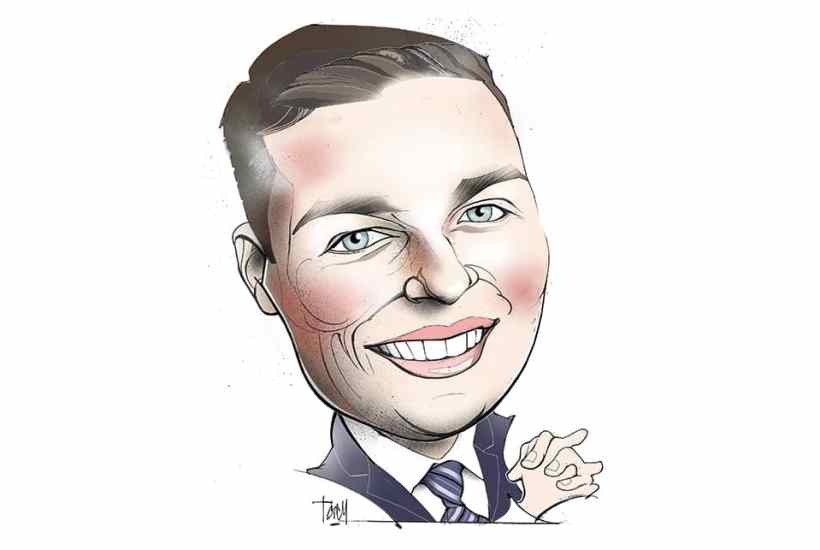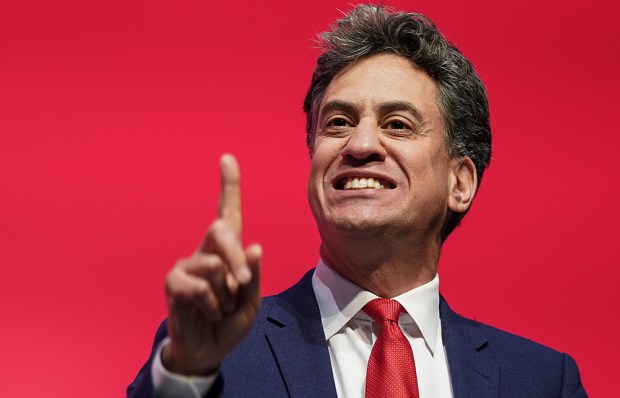When Labour MPs gossip about who could be their next leader, Wes Streeting’s name invariably comes up. Like Angela Rayner, the party’s deputy leader, Labour’s shadow health secretary spends half his time insisting he’s not running for the top job. Also like Rayner, he’s never actually stood for it – yet. But there have been plenty of moments in the past year when some of his comrades have wished he was the leader of the opposition rather than Keir Starmer.
Streeting became suspiciously more visible as the ‘Beergate’ investigation into whether Starmer and Rayner breached Covid restrictions reached its climax earlier this year. When I mentioned his frequent media appearances to another Labour front bencher, he shrugged: ‘When has Wes not been running?’
It’s true that Streeting, who was elected as the MP for Ilford North in 2015, often seems to be running for something. He was president of the National Union of Students for two terms between 2008 and 2010. The NUS is even harder work than the Labour party when it comes to factional infighting, particularly if, like Streeting, you’re a centrist. He worked as head of education for Stonewall and was a councillor in Redbridge before he entered parliament. At Cambridge, he was also active in student politics.
His early life, however, isn’t so typical of a Blairite politician. ‘I’m still one of a small minority of [MPs] who grew up experiencing poverty,’ he explains, as he tells me about his upbringing in Tower Hamlets. ‘I was born to teenage parents, my mum was 18 when I was born, my dad was 17. I was an accident and that relationship didn’t last more than a year after I was born. My dad was a very present father in my life but my mum was bringing me up as a single mum during the week, and I spent weekends with my dad. And for my mum, life was very hard.
‘There were plenty of times where the money in the meter ran out, so I’ve got some not great memories of the lights going out at home.’ Streeting became used to seeing his mother doing arithmetic as she did the grocery shopping, putting items back as she realised she couldn’t afford them. ‘I remember making her cry once because she was putting something back and I had five pounds of pocket money that my grandad had given to me. And my mum was really struggling, putting stuff back. I said to her, “Mummy, you can have this.” She was touched by the gesture but also that’s an awful position for parents to be in.’
Streeting is a very engaging politician who, unlike a surprising number of his colleagues, doesn’t struggle with eye contact. But I notice when he’s telling these stories from his childhood, he spends most of his time looking at a spot on the wall. His eyes flick back as he adds: ‘It’s one of the reasons I’m a member of the Labour party, because I think it’s part of our DNA to want to tackle these inequalities and injustices in our society.’
Most Labour activists have a tale about going campaigning with their parents. Streeting’s family were politically active too, but he confesses his first campaign story is less than ideal: ‘My nan was a member of the Labour party, and was very active, she dropped a load of leaflets round for me and my mum to deliver around the estate. And all my mum said was “Don’t tell Nanny we haven’t delivered them.”’
Streeting’s nan, Libby, was the subject of a news story earlier this year when it emerged that she had spent time in prison as the cellmate of Christine Keeler. She was jailed after refusing to help the police with their investigations into her boyfriend Bill, whom she later married. Bill was more familiar with prison than Libby, going in and out of it after convictions for armed robbery. Libby’s older sister Esme was friends with the Kray twins, and family legend has it that the gangsters named one of their nightclubs after her. Streeting himself visited his grandad in prison, but didn’t know the full extent of his underworld connections until the Daily Mail uncovered them.
He replaced Jonathan Ashworth as shadow health secretary in last year’s reshuffle. The NHS is often Labour’s comfort zone when it finds other issues too tricky to confront, but Streeting is happy to address difficult issues within health policy. He sees the private sector, for instance, as ‘one of the levers’ for tackling the backlog in treatment. ‘The Labour party can’t just rely on the same old hackneyed slogans on the NHS. We’ve got to demonstrate that it’s rescue and reform.’
This is personal: he’s only recently had the all-clear after being treated on the NHS for kidney cancer, and he says he’s seen both the ‘best and very frustrating elements’ of the health service during that time. ‘I’m going to be the patients’ champion, and I’m not going to have any patience with producer interests, and with the sort of bureaucratic excuses that let patients down sometimes.’
It was on Budget Day in March last year that he ended up in A&E with severe pain caused by a kidney stone. The urologists noticed something unusual on his scan, and decided to investigate further. He was given his diagnosis a few weeks later over the phone when out campaigning with Labour colleagues. The doctor told him he would need to have an operation to remove the tumour, but the prognosis was very good. ‘He stopped and said, “Do you have any questions, any reactions, how are you feeling?” I said, “Well if you’ll excuse my language, doctor, you’ve delivered the shit sandwich rather well.”’
Because of Covid restrictions, Streeting couldn’t take his partner, Joe, into the hospital with him for the operation. ‘It was the loneliest I’ve ever felt in my entire life.’ As a result, he pushed hard for family visiting rights to be restored as soon as possible in hospitals.
In his speech to Labour party conference next week, he plans to ‘put my tanks very firmly on the Conservative party’s lawn on the NHS because the dishonesty of Liz Truss’s position is that she pretends that she can fix the immediate crisis in front of us without significant extra resource. And I just don’t think that’s credible.’ He adds: ‘But I think what’s challenging for the left is also to understand and accept that there isn’t a credible, long-term answer to the NHS that only involves more money going in.
‘I’m absolutely committed to NHS free at the point of use, publicly funded, but I do think the system needs real reform in terms of the model of care we have in this country. We are spending far too much money too far down the patient journey. We’re pouring loads of money into hospitals, because we fail to grip conditions much earlier.’
He is sympathetic to the frustrations felt by nurses, who are balloting for strike action across Britain for the first time in the history of their Royal College, but will not be joining their picket lines, saying the party and trade unions have ‘complementary but different roles to play’. Starmer, he says, has been right to be so clear about frontbenchers not joining strikes.
Where his leader has been less clear is on gender politics. Starmer and Rachel Reeves and many other top figures spent months agonising over whether only women have cervixes, after their colleague Rosie Duffield found herself on the wrong end of a hate mob for making that statement. Streeting then breezed into a radio studio, and answered the question simply: ‘Men have penises, women have vaginas, here ends my biology lesson.’ He later insisted it was wrong for campaigners to ‘shut down’ J.K. Rowling and other ‘gender critical’ women.
What does Streeting think of Stonewall, his old employer and one of the key agitators in the gender debate? ‘Stonewall has been at its best on gay equality when it has sought to be the bridge-builder, when it sought to be the insider-influencer, rather than the activist and protestor… Obviously Stonewall wasn’t a trans-inclusive organisation when I worked there, which I thought was a shame, actually. But it has to think really hard about what kind of approach it wants to take… It’s a debate that requires a more thoughtful approach, a more compassionate approach, because I’m always mindful that there are trans people watching these programmes and reading the papers. And I think some of the language that’s being used is quite harmful to them.’ Labour is ‘getting there, we’ve landed in a much clearer place than we were before’.
There are those in Starmer’s team who have wondered why their leader couldn’t have taken the party into that clearer place himself, rather than relying on others. When I ask Streeting about his ambitions, he uses the stock line of ‘you never know what’s going to happen in politics’, before adding: ‘I’m very mindful of the fact that Labour’s never had a woman leader.’ But he also explains that he thinks that as things are, he always ‘has a leadership role in the Labour party’. ‘After Keir and Rachel, [the health secretary role] will be the hardest job in government after the next election if Labour wins.’ He is firmly on Team Keir, ‘but Keir’s not Superman, he can’t do it all by himself’.
Got something to add? Join the discussion and comment below.
Get 10 issues for just $10
Subscribe to The Spectator Australia today for the next 10 magazine issues, plus full online access, for just $10.
You might disagree with half of it, but you’ll enjoy reading all of it. Try your first month for free, then just $2 a week for the remainder of your first year.















Comments
Don't miss out
Join the conversation with other Spectator Australia readers. Subscribe to leave a comment.
SUBSCRIBEAlready a subscriber? Log in